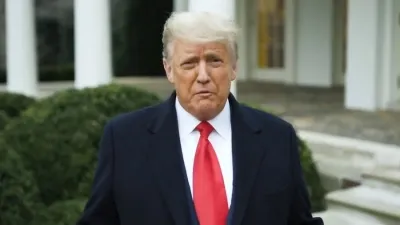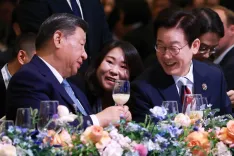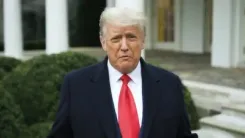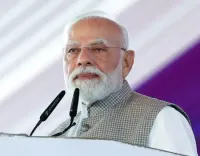Hindu Voters: A Key Influence in Bangladesh Elections
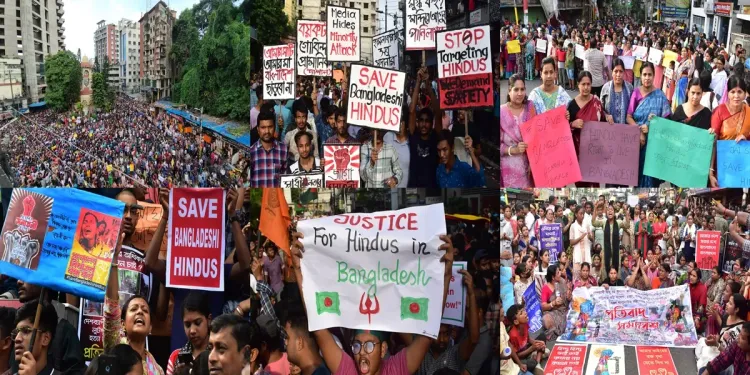
Synopsis
Key Takeaways
- Hindu voters constitute about 8% of Bangladesh's population.
- Minority voters can decisively influence election outcomes.
- Hindu persecution has been reported under all political regimes.
- Parties are vying for Hindu electoral support ahead of upcoming elections.
- Political strategies must address minority rights for electoral success.
New Delhi: In democratic nations, minority voters frequently become a pivotal element in elections, especially when they represent between five to fifteen percent of the electorate. Their voting inclinations can dramatically sway election results, determining which political party comes to power. This trend is evident in countries such as the United States, France, India, and the United Kingdom.
In the United States, minority voters, including African Americans, Latinos, and Asian Americans, account for nearly thirty percent of the electorate. Their backing was crucial in Barack Obama’s victories in 2008 and 2012. Similarly, in India, minority voters make up about fifteen percent of the population, with their influence particularly strong in states like Bihar and West Bengal. The electoral success of parties like the Indian National Congress, Trinamool Congress, and Samajwadi Party is heavily reliant on support from Muslim voters. In the UK, minorities of South Asian, African, and Caribbean origins represent around fourteen percent of the total population, with the Labour Party historically drawing robust support from these groups. In France, the Muslim minority, approximately nine percent of the population, plays a vital role in presidential elections, impacting candidates such as Emmanuel Macron. These instances illustrate the critical impact of minority voters in democratic elections globally.
In Bangladesh, Hindu voters similarly hold substantial importance in determining electoral outcomes. Traditionally, they have been instrumental in every national election. As of 2022, Hindus constitute about eight percent of Bangladesh’s population, or roughly thirteen million individuals (Bangladesh Bureau of Statistics, 2022). Despite a decrease in their percentage over the last fifty years, their absolute numbers have risen. In 1974, Hindus represented 13.5 percent of the population, which has since dropped to 7.95 percent. Census data from 1981 recorded the Hindu population at 12.1 percent, declining to 10.5 percent in 1991, 9.2 percent in 2001, 8.5 percent in 2011, and 7.95 percent in 2022. However, the Hindu population in absolute terms has steadily increased, from 9.6 million in 1974 to 13.5 million in 2022.
A significant portion of the Hindu electorate has historically supported the Awami League, perceiving it as a party dedicated to secularism and minority rights. Nonetheless, incidents of Hindu persecution, land appropriation, and communal unrest have continued under Awami League governance. The party has campaigned on promises to uphold secular principles and protect minority rights, leveraging its involvement in Bangladesh's liberation movement in 1971, led by Sheikh Mujibur Rahman, which aimed to establish a secular state.
To understand Hindu voting behaviors, one must consider their political, economic, and security concerns. Ensuring the safety of minority communities is essential for any party aspiring to earn their support. Hindu voters typically favor those who can effectively guarantee their security. Additionally, policies concerning minority welfare and local parliamentarians' attitudes towards the Hindu community significantly affect voter trust.
After the Awami League government fell on August 5 last year, the Hindu community once again faced persecution. Many Hindu residences and businesses were vandalized, severely jeopardizing their sense of safety, reminiscent of events in 1971, 1992, and 2001.
Historical election data underscores the vital role of Hindu voters in Bangladesh's parliamentary elections. A detailed examination of electoral patterns indicates that the vote share between the Awami League and the Bangladesh Nationalist Party (BNP) is frequently closely contested, making minority votes a decisive element. Other parties, such as the Jatiya Party and Jamaat-e-Islami, have never secured more than 5-6 percent of the total vote. Consequently, the eight percent Hindu vote remains immensely significant. Research shows that Hindu voters directly affect outcomes in 88 of Bangladesh’s 300 parliamentary constituencies—51 where they comprise more than 15 percent of voters and 38 where they make up between 10 and 15 percent. Districts like Gopalganj, Khulna, Thakurgaon, Dinajpur, Moulvibazar, Sunamganj, Habiganj, Narail, Bagerhat, Magura, Pirojpur, Barisal, and Chittagong are particularly influenced by Hindu voting trends.
Since independence, the Awami League has held an electoral edge among Hindu voters. However, between 2008 and 2022, despite Awami League governance, numerous instances of Hindu persecution have bred increasing discontent within the community. This discontent has made Hindu voters more receptive to alternative political options. Recognizing this, major political entities such as the BNP and the National Citizens’ Party (NCP) are expected to concentrate more on securing Hindu votes. Although BNP previously deployed anti-Hindu rhetoric in the 1991 and 2001 elections, it has recently adjusted its approach. In the 2018 elections, BNP even committed to special protective measures for religious minorities, acknowledging the electoral importance of Hindu voters.
The interim government has indicated that Bangladesh’s next national elections could occur in December this year. As the electoral process intensifies, political parties are actively devising strategies to attract Hindu voters. Concurrently, the Hindu community is more cognizant and unified than ever before. Since August 5, they have launched various public initiatives to express their concerns.
Given these circumstances, any political party that devises and enacts authentic policies for minority protection could utilize Hindu voter support as a 'trump card' in electoral strategies.
Historically, the Hindu community’s confidence in the Awami League was grounded in the principles of the Liberation War and secular governance. However, over time, administrative failures and actions by certain party leaders have diminished this trust. Significant incidents of violence and land seizures—documented in 2012, 2013, 2016, and 2021—have often involved local Awami League figures. Although the Constitution endorses secularism, no specific protective legislation for minorities has been enacted. The 'Vested Property Act', which historically allowed for the confiscation of Hindu property, remains in effect, rendering land ownership a continual challenge for the community.
In this light, if any political party can genuinely assure security and equal rights for minorities, Hindu voters may align with them—potentially becoming a decisive factor in the forthcoming elections.
(The writer is a columnist specializing in Bangladesh affairs. Views expressed are personal)




